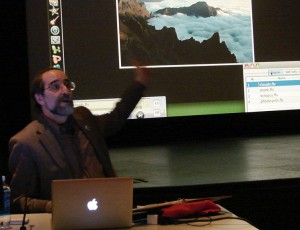Lawrence Weschler loves the Web. So why is it a problem, then?
Permanence, for starters. The “extreme perishability of digital information” is of great concern to Weschler, who spoke on campus last Monday as part of the Big Picture Lecture Series. “Cuneiform tablets and papyrus scrolls have lasted thousands of years,” he explains. “Digital information, on the other hand, is catastrophic.”
 Weschler argues the problem is that digital information decays over time, as well as the equipment and software used. Floppy discs, VHS tapes, CDs—these disposable media forms are quickly becoming archaic, and the work they contain becomes lost forever.
Weschler argues the problem is that digital information decays over time, as well as the equipment and software used. Floppy discs, VHS tapes, CDs—these disposable media forms are quickly becoming archaic, and the work they contain becomes lost forever.
“The entire Clinton administration, in terms of history, is gone,” Weschler says. “Almost everything was conducted via email, with devices that are no longer around to use.” (Not to mention the fact that an external hard drive containing copies of data from the administration was discovered missing by the National Archives and Records Administration in 2009.)
A second issue, according to Weschler, is the “palpable substantiality of books,” or the stability of a printed book versus the instability and frantic nature of the Web. Books have substance and soul, while the Web is filled with insubstantiality and soullessness. “There is no calm centeredness on the Web,” he says. “Just a frenzy of echoes that rebound and go from one thing to the next. Which is its great strength as well.”
There is another set of issues with the Web related to authors. “The value of publishing a book for a writer is much the same as a visual artist putting together an exhibition,” Weschler says. “Preparing for an exhibition forces artists to self-edit, take stock in their work and decide what was good and what wasn’t.” You can’t do this on the Web, he argues. “It’s just too easy to put things up without the proper foresight or editing.”
Then there is the question of how much the Web can bear as a medium. “The Web does not handle long-form narrative well,” he continues. “You can’t read a 20,000 word piece online. The better the prose, the less well it reads online.”
Weschler writes for McSweeney’s Quarterly, serves as director of New York University’s New York Institute for the Humanities and is artistic director of the Chicago Humanities Festival. For more than 20 years, he was a staff writer at The New Yorker. His award-winning book, Everything That Rises: A Book of Convergences, inspired an online contest at McSweeney’s: A Convergence of Convergences. Participants submit a convergence—an unlikely, striking pair of images—along with a paragraph or two exploring the deeper resonances, and Weschler provides commentary. The results are quite interesting, and Weschler is lobbying to have the results compiled into a new book titled All That Is Solid. His publishers have suggested that it should not be made into a book, since the information has already been posted online. It was this decision that prompted Weschler to detail the many problems of the Web, and how in the war of Web versus books, books win.
Weschler ended his talk with Robert Frost’s Nothing Gold Can Stay:
Nature’s first green is gold
Her hardest hue to hold.
Her early leaf’s a flower;
But only so an hour.
Then leaf subsides to leaf.
So Eden sank to grief,
So dawn goes down to day.
Nothing gold can stay.
Should Weschler’s book be published? Does the book really win the war of Web versus books? Or does he have it all wrong?








